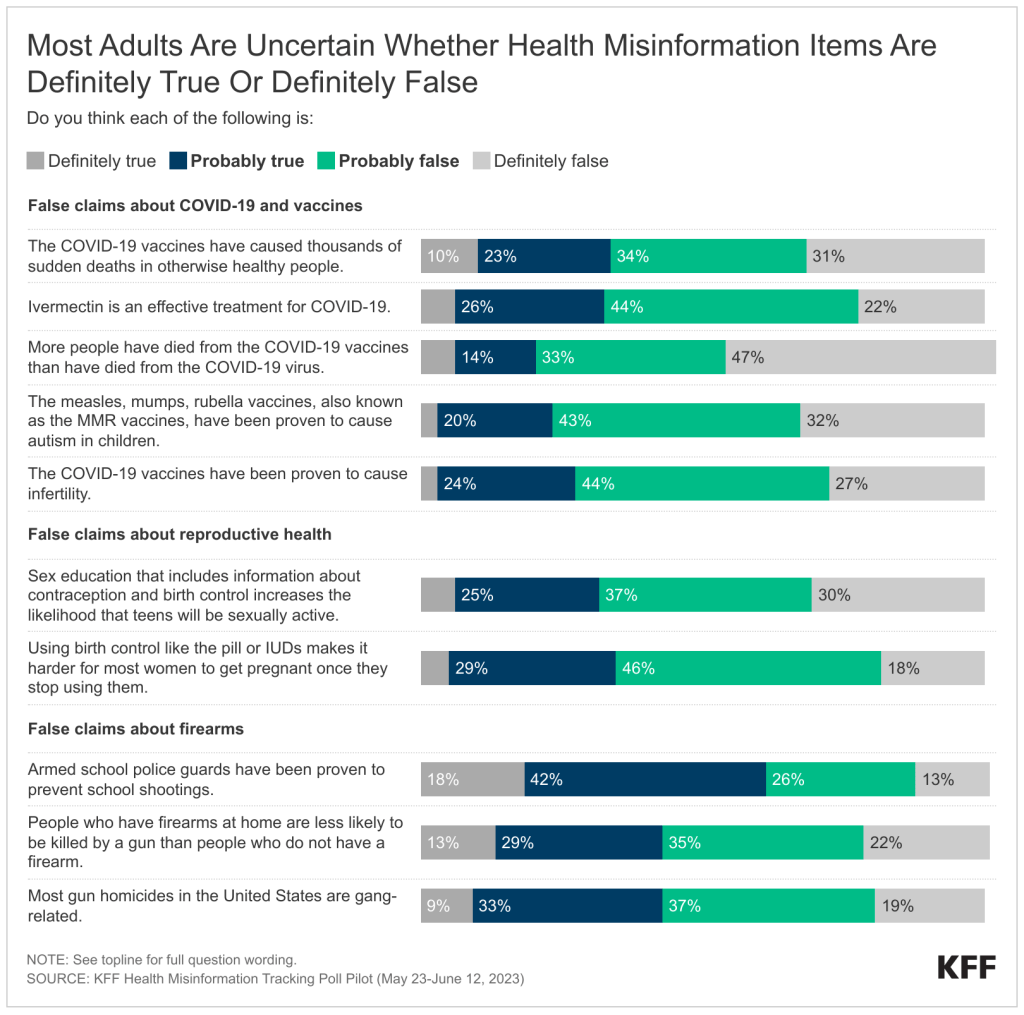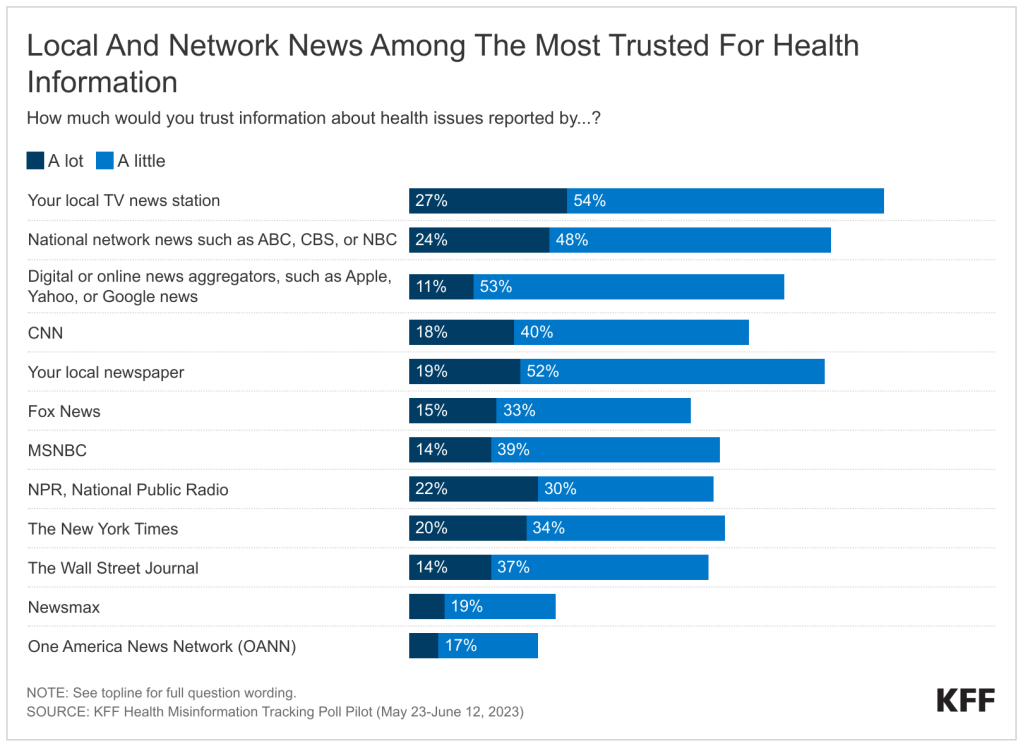[ad_1]
A new KFF survey unearths the huge achieve of well being incorrect information, with a minimum of 4 in 10 other folks pronouncing that they’ve heard every of 10 particular false claims about COVID-19, reproductive well being, and gun violence.
Fairly small stocks say that every of the ones false claims are “for sure true”, starting from as few as 3% who definitively consider that COVID-19 vaccines had been confirmed to reason infertility to as many as 18% who definitively consider armed faculty guards had been confirmed to forestall faculty shootings.
On the identical time, kind of part to three-quarters of the general public are unsure whether or not every of the ten false claims are true or now not, describing them as both “most certainly true” or “most certainly false.” This means that even if other folks don’t consider false claims they pay attention, it will possibly create uncertainty about sophisticated public well being subjects.
“Most of the people aren’t true believers within the lies or the info about well being problems; they’re in a muddled center,” KFF President and CEO Drew Altman mentioned. “The general public’s uncertainty leaves them prone to incorrect information however may be the chance to struggle it.”

The brand new survey is one element of a brand new KFF program space geared toward figuring out and tracking well being incorrect information and consider in the USA, striking explicit emphasis on communities which might be maximum adversely suffering from incorrect information, equivalent to other folks of colour, immigrants and rural communities.
Along these days’s survey findings, KFF will quickly free up better half survey experiences highlighting the level of well being incorrect information amongst Black and Hispanic adults, in addition to rural citizens. KFF will even quickly free up a normal “Well being Incorrect information Track,” which can record rising well being incorrect information, establish its number one assets, and read about the position that social media and information retailers play in its unfold. Sign up for alerts from KFF on this topic. KFF Well being Information may be increasing its reporting on this topic together with the brand new program.
“Whilst many American citizens battle to split well being knowledge reality from fiction, our survey displays that credible assets of data, and messengers, constitute a chance to damage thru and lend a hand build up consider,” mentioned Irving Washington, senior fellow for incorrect information and consider at KFF. “We’ll proceed to concentrate on this chance and what form of efforts could make a distinction.”
The incorrect information tested within the survey contains:
- Vaccines. A 3rd (34%) of adults say the false declare that COVID-19 vaccines have brought about 1000’s of surprising deaths in differently wholesome other folks is for sure (10%) or most certainly (23%) true. Black adults are much more likely to consider this false commentary than White adults, whilst Republicans and independents are much more likely than Democrats to take action. Other people with school levels are much less most probably than the ones with a high-school training or much less to mention that is true.
- Reproductive well being. A few 3rd of adults say the false declare that the use of delivery keep watch over such because the tablet or an IUD makes it more difficult for most girls to get pregnant after they prevent the use of them is “for sure” (5%) or “most certainly” true (29%). Adults below the age of 65, Republicans, independents, and Black and Hispanic adults are much more likely to mention this declare is right than their opposite numbers.
- Gun violence. When requested concerning the faulty commentary that individuals who have firearms at house are much less more likely to be killed with a gun, about 4 in ten (42%) say it’s “for sure” (13%) or “most certainly” (29%) true. Gun house owners are much more likely than non-gun house owners to mention that this false declare is for sure or most certainly true (55% vs. 37%).
The survey additionally unearths how numerous other folks’s ideals and perceptions are about what constitutes incorrect information. For instance, when requested to explain particular incorrect information associated with COVID-19 that they’ve heard, other folks volunteered statements that have been in direct contradiction with one any other, together with concerning the protection and effectiveness of COVID-19 vaccines and of dressed in mask to forestall the virus’ unfold.
Who Other people Consider for Well being Data
The survey additionally gauges other folks’s consider in more than a few assets of well being knowledge:
- Docs. No longer strangely, other folks overwhelmingly say that they consider their very own physician’s suggestions – with 93% pronouncing they consider their medical doctors a minimum of an excellent quantity.
- Federal companies. About two thirds of the general public say they have got a minimum of an excellent quantity of consider within the Facilities for Illness Keep watch over (67%) and the Meals and Drug Management (65%) to make the fitting suggestions on the subject of well being problems. Democrats are much more likely than both independents or Republicans to consider the 2 federal companies. About part of Republicans say they consider each the CDC (49%) and FDA (54%).
- Conventional information assets. The most important stocks of the general public say they’d have a minimum of a bit of consider in well being knowledge reported by means of their native TV information stations (80%), nationwide community information (72%), and their native newspaper (72%). CNN is essentially the most relied on cable information community (58%), with smaller stocks trusting MSNBC (52%), Fox Information (49%), Newsmax (25%) or One American Information Community (22%). Fewer than 3 in ten adults say they have got “so much” of consider in well being knowledge from any of those media assets.
- Social media assets. A few quarter (24%) of adults say that they use social media a minimum of weekly to seek out well being knowledge or recommendation, together with higher stocks of Hispanic and Black adults, and other folks in low-income families. Of 8 particular social media assets, part (52%) would consider details about well being problems they noticed on YouTube a minimum of a bit of. Fewer say they’d consider well being knowledge in the event that they noticed it on Fb (40%), Twitter (29%), Instagram (27%), and different platforms. Fewer than one in ten say they have got a large number of consider in well being knowledge from any of those social media assets.

The survey document examines the assets to which individuals pass to get their information and their susceptibility to incorrect information. Lower than part (45%) of adults say they have got heard some of the 5 false COVID-19 and vaccine claims and consider it’s for sure or most certainly true. That percentage rises to 76% of normal Newsmax audience, and 67% of normal OANN audience, and 61% of normal Fox Information audience.
In a similar fashion, 54% of those that use social media for well being knowledge and recommendation a minimum of weekly say they have got heard a minimum of some of the false COVID-19 and vaccine claims and assume it’s for sure or most certainly true, in comparison to 40% of those that don’t use social media for well being recommendation.
Designed and analyzed by means of public opinion researchers at KFF, the KFF Well being Incorrect information Monitoring Ballot Pilot was once carried out Would possibly 23-June 12, 2023, on-line and by means of phone amongst a consultant pattern of two,007 U.S. adults. Interviews have been carried out in English and in Spanish. The margin of sampling error is plus or minus 3 share issues for the total pattern. For effects in accordance with subgroups, the margin of sampling error could also be upper. Make stronger for this paintings was once supplied by means of the Robert Picket Johnson Basis (RWJF). The perspectives expressed don’t essentially replicate the perspectives of RWJF. KFF maintains complete editorial keep watch over over all of its coverage research, polling, and journalism actions.
[ad_2]
Source link
